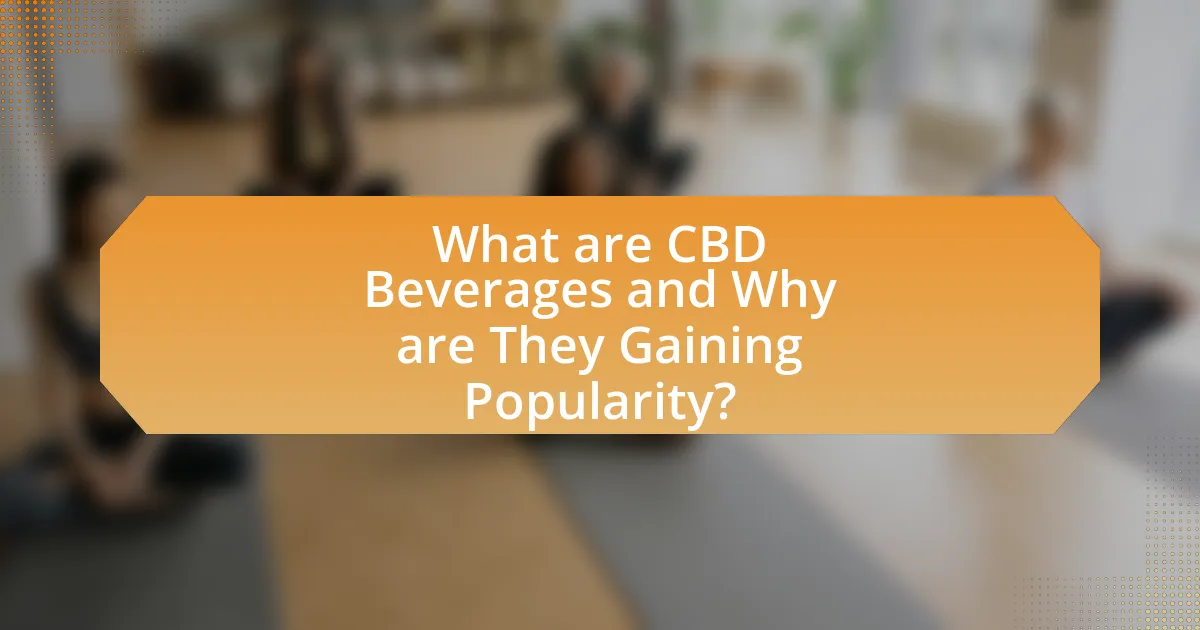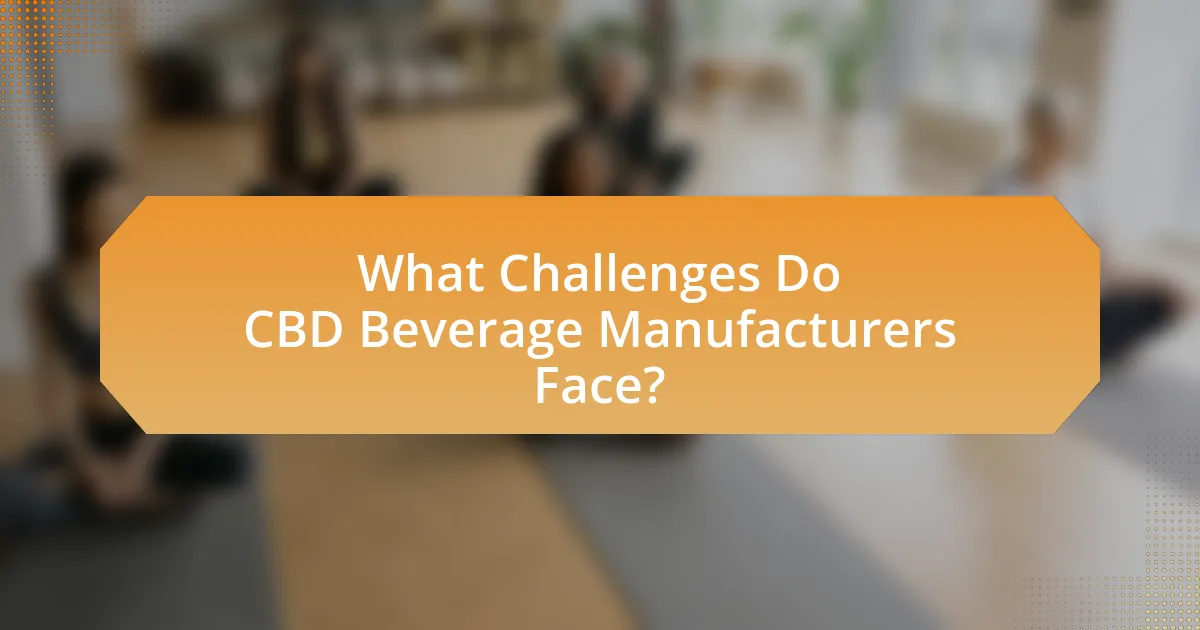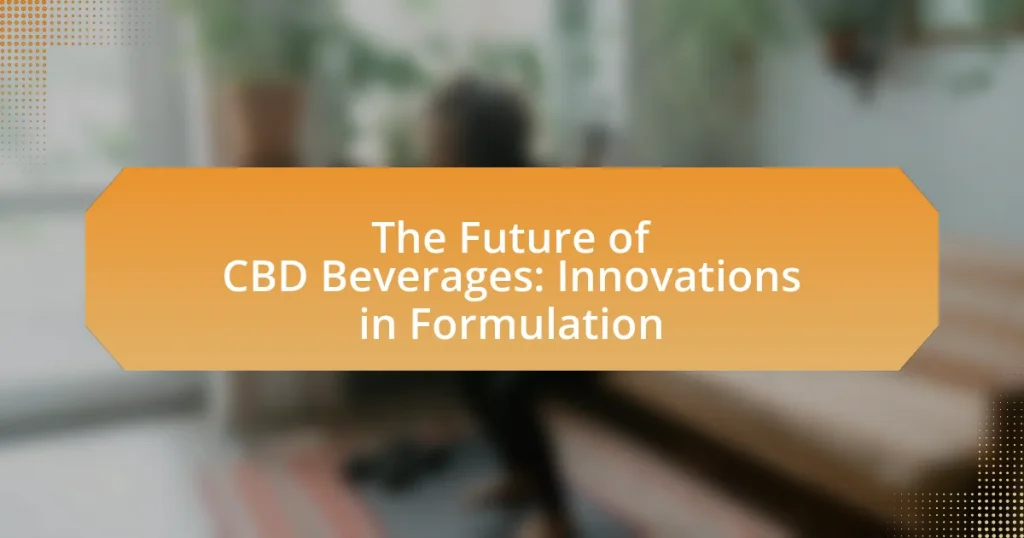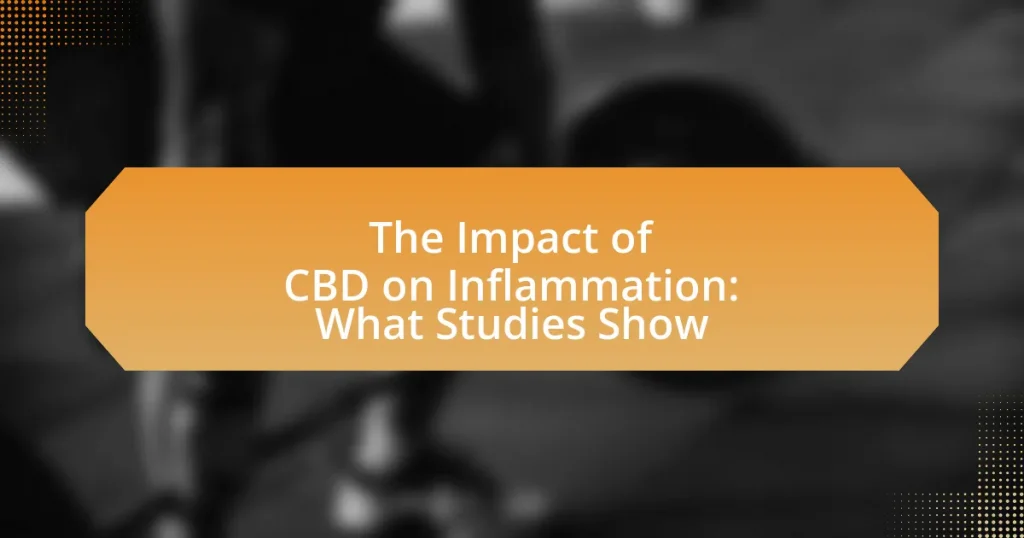CBD beverages are drinks infused with cannabidiol, a non-psychoactive compound from the cannabis plant, gaining popularity due to their perceived health benefits and the growing consumer interest in natural wellness products. The article explores the differences between CBD beverages and traditional drinks, common ingredients, extraction methods, and potential health benefits such as anxiety reduction and improved sleep quality. It also discusses innovations in formulation, including nanoemulsion technology, and the challenges manufacturers face, such as regulatory hurdles and consumer misconceptions. Additionally, the article highlights emerging trends in the market, consumer preferences, and practical tips for selecting high-quality CBD beverages.

What are CBD Beverages and Why are They Gaining Popularity?
CBD beverages are drinks infused with cannabidiol, a non-psychoactive compound derived from the cannabis plant. Their popularity is increasing due to growing consumer interest in natural wellness products, perceived health benefits such as stress relief and improved sleep, and the expanding variety of flavors and formulations available in the market. According to a report by Grand View Research, the global CBD beverage market is expected to reach $2.8 billion by 2025, reflecting a significant rise in consumer demand and acceptance.
How do CBD Beverages differ from traditional beverages?
CBD beverages differ from traditional beverages primarily in their inclusion of cannabidiol, a non-psychoactive compound derived from cannabis. Unlike conventional drinks, which typically contain sugars, flavors, and preservatives, CBD beverages are formulated to provide potential therapeutic benefits, such as relaxation and stress relief, attributed to the effects of CBD on the endocannabinoid system. Research indicates that CBD can influence mood and anxiety levels, making these beverages appealing for wellness-focused consumers. Additionally, CBD beverages often undergo specific extraction and formulation processes to ensure bioavailability and consistent dosing, which is not a standard practice in traditional beverage production.
What ingredients are commonly found in CBD Beverages?
CBD beverages commonly contain ingredients such as cannabidiol (CBD), water, sweeteners, flavorings, and sometimes additional functional ingredients like vitamins or electrolytes. Cannabidiol is the primary active compound derived from hemp, known for its potential therapeutic effects. Water serves as the base for most beverages, while sweeteners and flavorings enhance taste, making the product more appealing to consumers. Additionally, some formulations may include vitamins like B12 or electrolytes to provide added health benefits, reflecting a trend towards functional beverages in the market.
How is CBD extracted and incorporated into beverages?
CBD is extracted primarily through methods such as CO2 extraction, ethanol extraction, and oil infusion. CO2 extraction is the most common method, utilizing pressurized carbon dioxide to pull CBD from the hemp plant, resulting in a pure and potent extract. Ethanol extraction involves soaking the plant material in ethanol, which dissolves the cannabinoids, while oil infusion uses carrier oils to extract CBD through heat.
Once extracted, CBD is incorporated into beverages by formulating it into emulsions or nanoemulsions, which enhance its solubility and bioavailability in water-based drinks. This process allows for uniform distribution of CBD throughout the beverage, ensuring consistent dosing. Studies have shown that nanoemulsions can increase the absorption rate of CBD, making it more effective when consumed.
What are the potential health benefits of CBD Beverages?
CBD beverages may offer several potential health benefits, including anxiety reduction, pain relief, and improved sleep quality. Research indicates that CBD interacts with the endocannabinoid system, which plays a crucial role in regulating mood, pain perception, and sleep cycles. A study published in the Journal of Clinical Psychology found that CBD significantly reduced anxiety levels in participants, demonstrating its potential as a therapeutic agent for anxiety disorders. Additionally, a review in the journal Frontiers in Pharmacology highlighted CBD’s analgesic properties, suggesting it may help alleviate chronic pain. Furthermore, a study in the Permanente Journal reported that CBD improved sleep quality in individuals with insomnia. These findings support the notion that CBD beverages could serve as a functional option for enhancing overall well-being.
How does CBD interact with the human body?
CBD interacts with the human body primarily through the endocannabinoid system (ECS), which regulates various physiological processes. The ECS consists of cannabinoid receptors, endocannabinoids, and enzymes, and it plays a crucial role in maintaining homeostasis. CBD binds to the CB1 and CB2 receptors, influencing neurotransmitter release and modulating pain, mood, and immune responses. Research indicates that CBD can reduce anxiety and inflammation, as evidenced by a study published in the Journal of Psychopharmacology, which found that CBD significantly decreased anxiety in participants during public speaking tasks. This interaction highlights CBD’s potential therapeutic effects on mental and physical health.
What scientific studies support the health claims of CBD Beverages?
Scientific studies supporting the health claims of CBD beverages include a 2019 study published in the journal “Frontiers in Pharmacology,” which found that CBD may reduce anxiety and improve sleep quality. The research, conducted by Shannon et al., indicated that participants experienced significant reductions in anxiety levels after consuming CBD. Additionally, a 2020 study in the “Journal of Clinical Medicine” by Hurd et al. demonstrated that CBD could help alleviate symptoms of post-traumatic stress disorder (PTSD), further supporting its therapeutic potential in beverages designed for stress relief. These studies provide concrete evidence of the health benefits associated with CBD consumption in beverage form.

What Innovations are Shaping the Future of CBD Beverages?
Innovations shaping the future of CBD beverages include advanced formulation techniques, enhanced bioavailability, and the integration of functional ingredients. Advanced formulation techniques, such as nanoemulsion and microencapsulation, improve the absorption of CBD, making it more effective in beverages. Enhanced bioavailability allows consumers to experience the benefits of CBD more quickly and efficiently, with studies indicating that nanoemulsified CBD can increase absorption rates by up to 200%. Additionally, the incorporation of functional ingredients like adaptogens and vitamins caters to health-conscious consumers, creating beverages that not only provide relaxation but also support overall wellness. These innovations are driving the growth of the CBD beverage market, projected to reach $2.8 billion by 2025, according to a report by Grand View Research.
How are manufacturers improving the formulation of CBD Beverages?
Manufacturers are improving the formulation of CBD beverages by enhancing bioavailability and flavor profiles. Techniques such as nanoemulsion technology are being utilized to increase the absorption rate of CBD in the body, allowing for more effective delivery. Additionally, manufacturers are experimenting with natural flavoring agents and sweeteners to create more palatable products, addressing consumer preferences for taste. Research indicates that these innovations not only improve the overall consumer experience but also ensure that the therapeutic benefits of CBD are maximized, as seen in studies demonstrating increased efficacy with improved formulations.
What role does nanoemulsion technology play in CBD Beverages?
Nanoemulsion technology enhances the bioavailability and stability of CBD in beverages. By reducing the size of CBD droplets to the nanometer scale, this technology allows for better absorption in the body, leading to more effective delivery of the compound. Studies indicate that nanoemulsions can increase the solubility of CBD in water, which is crucial for formulating beverages, as CBD is typically hydrophobic. This improved solubility results in a more uniform distribution of CBD throughout the beverage, ensuring consistent dosing and efficacy.
How are flavor profiles being enhanced in CBD Beverages?
Flavor profiles in CBD beverages are being enhanced through the use of natural flavoring agents, innovative extraction methods, and the incorporation of complementary ingredients. Natural flavoring agents, such as fruit extracts and herbal infusions, provide a diverse range of tastes that mask the earthy flavor of CBD. Innovative extraction methods, like CO2 extraction, preserve the terpenes and cannabinoids, which contribute to the overall flavor complexity. Additionally, the inclusion of complementary ingredients, such as adaptogens and botanicals, not only enhances flavor but also adds functional benefits, making the beverages more appealing to consumers. This approach aligns with market trends that show a growing demand for flavorful and health-oriented beverage options.
What trends are emerging in the CBD Beverage market?
Emerging trends in the CBD beverage market include the rise of functional beverages, increased focus on health and wellness, and the incorporation of diverse flavors and ingredients. Functional beverages, such as those targeting stress relief or enhanced focus, are gaining popularity as consumers seek products that offer specific benefits beyond hydration. The health and wellness trend is reflected in the growing demand for organic and natural ingredients, with consumers increasingly prioritizing transparency in sourcing and formulation. Additionally, innovative flavor combinations and the use of adaptogens and botanicals are becoming common as brands aim to differentiate their products in a competitive market. According to a report by Grand View Research, the global CBD beverage market is expected to grow significantly, indicating a robust consumer interest in these evolving trends.
How are consumer preferences influencing product development?
Consumer preferences are significantly influencing product development by driving companies to create CBD beverages that align with health-conscious trends and flavor innovations. As consumers increasingly seek natural ingredients and functional benefits, manufacturers are formulating products that emphasize organic sourcing and wellness attributes, such as stress relief and enhanced focus. For instance, a survey by the Brightfield Group found that 66% of CBD consumers prioritize product quality and ingredient transparency, prompting brands to adopt cleaner labels and more sustainable practices. This shift not only reflects consumer demand but also shapes the competitive landscape, as companies that fail to adapt risk losing market share to those that meet evolving preferences.
What new types of CBD Beverages are being introduced?
New types of CBD beverages being introduced include CBD-infused sparkling waters, ready-to-drink CBD teas, and CBD-enhanced functional beverages targeting specific health benefits such as relaxation or energy. The market has seen a rise in these innovative formulations as consumer demand for wellness-oriented products increases, with companies like Recess and Cann leading the way in creating unique flavor profiles and functional ingredients. These developments reflect a broader trend in the beverage industry towards incorporating cannabinoids for their potential therapeutic effects, supported by growing consumer interest in natural health solutions.

What Challenges Do CBD Beverage Manufacturers Face?
CBD beverage manufacturers face regulatory hurdles, inconsistent supply chains, and formulation challenges. Regulatory hurdles arise from varying laws regarding CBD across different regions, complicating compliance and market access. Inconsistent supply chains can lead to fluctuations in the quality and availability of CBD, impacting product consistency. Additionally, formulation challenges include achieving the right taste and stability of CBD in beverages, as CBD is hydrophobic and can affect the overall sensory experience. These factors collectively hinder the growth and marketability of CBD beverages.
How do regulatory issues impact the CBD Beverage industry?
Regulatory issues significantly impact the CBD beverage industry by dictating the legal framework within which companies operate. These regulations affect product formulation, labeling, marketing, and distribution, often leading to increased compliance costs and limiting market access. For instance, the U.S. Food and Drug Administration (FDA) has not yet established a clear regulatory pathway for CBD in food and beverages, creating uncertainty for manufacturers. This lack of clarity can hinder innovation and investment, as companies may be reluctant to develop new products without assurance of regulatory approval. Additionally, varying state laws can complicate distribution, as some states have more stringent regulations than others, leading to a fragmented market.
What labeling requirements must CBD Beverages comply with?
CBD beverages must comply with labeling requirements that include disclosing the amount of CBD per serving, listing all ingredients, and providing nutritional information. Additionally, labels must indicate whether the product contains THC, include a statement of identity, and provide the manufacturer’s contact information. These requirements are enforced by the FDA and state regulations to ensure consumer safety and transparency.
How do varying state laws affect distribution and sales?
Varying state laws significantly impact the distribution and sales of CBD beverages by creating a complex regulatory landscape that businesses must navigate. For instance, some states permit the sale of CBD-infused products, while others impose strict restrictions or outright bans, leading to inconsistencies in market access. According to the 2021 Farm Bill, hemp-derived CBD is federally legal, but individual states can enforce their own regulations, which can include licensing requirements, labeling standards, and testing protocols. This patchwork of laws can hinder companies from expanding their distribution networks and complicate compliance efforts, ultimately affecting sales performance and market growth.
What are the common misconceptions about CBD Beverages?
Common misconceptions about CBD beverages include the belief that they cause psychoactive effects, that they are illegal, and that they are a cure-all for health issues. CBD, or cannabidiol, is non-psychoactive, meaning it does not produce the “high” associated with THC, the psychoactive compound in cannabis. Additionally, CBD derived from hemp is legal in many regions, including the United States, as long as it contains less than 0.3% THC. Furthermore, while some consumers may think CBD beverages can cure ailments like anxiety or chronic pain, scientific evidence supporting these claims is still limited, and they should not replace conventional medical treatments.
How does the perception of CBD differ from THC?
The perception of CBD differs from THC primarily in their psychoactive effects; CBD is generally viewed as non-intoxicating, while THC is recognized for its psychoactive properties that induce a high. Research indicates that CBD is often associated with therapeutic benefits such as anxiety reduction and anti-inflammatory effects, leading to a more favorable public perception, especially in wellness contexts. In contrast, THC is frequently linked to recreational use and potential legal issues, which can contribute to a more negative perception in certain demographics. This distinction influences consumer preferences and market trends in the beverage industry, where CBD is increasingly embraced for its health-oriented image, while THC remains more controversial.
What myths exist regarding the safety and efficacy of CBD Beverages?
Myths regarding the safety and efficacy of CBD beverages include the belief that they cause psychoactive effects, that they are universally safe for everyone, and that they can cure serious medical conditions. CBD, or cannabidiol, is non-psychoactive, meaning it does not produce the “high” associated with THC, the psychoactive component of cannabis. Additionally, while many users report benefits, CBD beverages are not guaranteed to be safe for all individuals, particularly those with specific health conditions or those taking certain medications, as interactions can occur. Furthermore, claims that CBD can cure diseases lack substantial scientific backing; research indicates potential therapeutic effects but does not confirm it as a cure-all.
What practical tips should consumers consider when choosing CBD Beverages?
Consumers should consider the source and quality of CBD when choosing CBD beverages. High-quality CBD is typically derived from organically grown hemp and undergoes third-party testing to ensure purity and potency. Additionally, consumers should check the CBD concentration in the beverage, as effective dosages generally range from 10 to 50 mg per serving, depending on individual tolerance and desired effects. It is also important to review the ingredient list for any additives or allergens, as well as to verify the presence of a Certificate of Analysis (COA) from a reputable lab, which confirms the product’s cannabinoid profile and safety.
How can consumers identify high-quality CBD Beverages?
Consumers can identify high-quality CBD beverages by examining the product’s sourcing, lab testing, and ingredient transparency. High-quality CBD beverages typically use hemp sourced from reputable farms that adhere to organic farming practices, ensuring the absence of pesticides and harmful chemicals. Additionally, reputable brands provide third-party lab test results that confirm the potency and purity of the CBD, allowing consumers to verify that the product contains the advertised amount of CBD and is free from contaminants. Furthermore, high-quality beverages often list all ingredients clearly, avoiding artificial additives and emphasizing natural flavors, which enhances both safety and taste.
What dosage guidelines should consumers follow for CBD Beverages?
Consumers should generally follow a dosage guideline of 5 to 10 mg of CBD per serving for CBD beverages. This range is considered effective for most individuals, as studies indicate that doses within this limit can provide therapeutic benefits without significant side effects. For example, a study published in the journal “Cannabis and Cannabinoid Research” found that doses of 10 mg of CBD were well-tolerated and effective for anxiety relief. It is advisable for consumers to start at the lower end of the dosage range and gradually increase as needed, while also considering individual factors such as body weight and tolerance.



